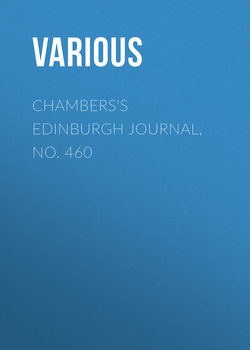Chambers's Edinburgh Journal, No. 460

Реклама. ООО «ЛитРес», ИНН: 7719571260.
Оглавление
Various. Chambers's Edinburgh Journal, No. 460
PRESERVED MEATS AND MEAT-BISCUITS
THE BUYER OF SOULS:
A Russian Story
SPELLING-BOOK VERSUS HORN-BOOK
A FEW WORDS ABOUT ROOMS AND THEIR ORNAMENTS
INVESTMENTS!
THE OSTRICH
PROGRESS OF THE UNITED STATES
EFFECT OF THE EARTH'S ROTATION ON LOCOMOTION
FOREST SCENERY OF AMERICA
THE BETTER THOUGHT
Отрывок из книги
All over the world, the essential elements of human nature are the same. And it is very fortunate for me that they are so, else I should find myself in considerable difficulty in endeavouring to place before my readers a correct picture of the little, out-of-the-way town of Nikolsk. Making due allowances for the differences in national manners and customs; for Nikolsk being under the dominion of his autocratic majesty the emperor of all the Russias, instead of the mild, constitutional government of Queen Victoria, there is no great discrepancy between Nikolsk and any equally out-of-the-way town in England. It has the same dearth of excitement, the same monotonous uniformity of life; it lives in the same profound ignorance of the great incidents that the drama of human existence is developing on the theatre of the world at large; it has its priest, its doctor, its lawyer, its post-office where a seal is not so sacred as it might be, or rather where the problem of getting at the news, without breaking the wax, has been successfully solved; it has the same thirst for scandal, the same intense interest for the most contemptible trivialities, the same constantly impending danger of suicide from ennui, did not human nature adapt itself to its environments, and sink into pettiness as naturally as though there were no such things as towns and cities, and enlarged views of man and nature in the world: all these it has the same as any British Little Pedlington. Then it has its circles of social intercourse, as rigidly defined and as intensely venerated as the rules of court precedence. The difference in the social scale between a landowner, a tenant, a member of the professions, a tradesman, a publican, a sweep, and a beggar, is accurately prescribed and religiously observed—with this addition, however, that in Nikolsk the owners of land are also owners of the serfs upon the land, and that the numerous representatives of that most centralised of all governments cut an important figure in the snobberies of the place. In fine, there is one little English word that describes Nikolsk completely, and that is—dull. It is dull—beyond comprehension dull. No town in the universe can be duller; because, from its quintessential dulness, there is but one step to total inanition.
Thus, in Nikolsk, the ancient saying, that there is nothing new under the sun, was daily and hourly verified. Week after week, and year after year, the governor pillaged the people; the inspector of charities pillaged the charities; the inspector of nuisances sedulously avoided inspecting at all, lest, by removing them, the need for his services should cease; the landowner ground down the serfs; the tax-assessor ground the landowners; and everybody, in return for the favours a paternal government showered upon them through its immaculate representatives, cheated and defrauded that government with a persistency and perseverance approaching the sublime. Mothers of daughters were in despair, for in Nikolsk there were no 'nice young men,' no eligible matches; fathers of sons despaired in their turn, for as everybody robbed everybody, and the government robbed the robbers, there were no heiresses; ladies wore the fashions of 1820 in 1840, under the impression that they were the newest from Paris; the reading portion of the community were just beginning to hear of Voltaire as a promising writer; and the general public laboured under the fixed idea, that somewhere or other Napoleon was still prosecuting his leviathan campaigns, happily not
.....
Thus, in Nikolsk, the ancient saying, that there is nothing new under the sun, was daily and hourly verified. Week after week, and year after year, the governor pillaged the people; the inspector of charities pillaged the charities; the inspector of nuisances sedulously avoided inspecting at all, lest, by removing them, the need for his services should cease; the landowner ground down the serfs; the tax-assessor ground the landowners; and everybody, in return for the favours a paternal government showered upon them through its immaculate representatives, cheated and defrauded that government with a persistency and perseverance approaching the sublime. Mothers of daughters were in despair, for in Nikolsk there were no 'nice young men,' no eligible matches; fathers of sons despaired in their turn, for as everybody robbed everybody, and the government robbed the robbers, there were no heiresses; ladies wore the fashions of 1820 in 1840, under the impression that they were the newest from Paris; the reading portion of the community were just beginning to hear of Voltaire as a promising writer; and the general public laboured under the fixed idea, that somewhere or other Napoleon was still prosecuting his leviathan campaigns, happily not
Безопасно оплатить книгу можно банковской картой Visa, MasterCard, Maestro, со счета мобильного телефона, с платежного терминала, в салоне МТС или Связной, через PayPal, WebMoney, Яндекс.Деньги, QIWI Кошелек, бонусными картами или другим удобным Вам способом.
.....